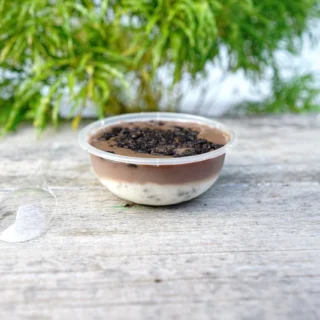Discover a delicious chicken of the woods recipe that brings the forest to your table. Learn how to prepare this wild mushroom for a unique, flavorful meal.
As you step into the verdant, sun-dappled forest, the scent of damp earth fills the air. Hidden amidst the towering trees, a vibrant, shelf-like mushroom clings to the bark. This, my friend, is the elusive and captivating Chicken of the Woods. Discovering a delicious chicken of the woods recipe can make your forest find even more rewarding.
This wild treasure can transform your dining experience from ordinary to extraordinary.
In this article, we’ll explore the forest together. We’ll learn how to identify, forage, and prepare this unique mushroom. Whether you’re a seasoned forager or a curious cook, this recipe will become your new favorite.
Identifying the Elusive Chicken of the Woods
Chicken of the Woods, also known as the “sulfur shelf,” is a unique mushroom. It has bright yellow or orange color and fan-shaped caps. It grows in clusters on oak, maple, or hemlock trees in damp, wooded areas after rain.
Its tender flesh that pulls apart easily is a key feature. This makes it easy to spot in the forest.
Appearance and Habitat
To safely identify Chicken of the Woods, look for its vibrant coloring and lack of a stem. It can pull apart into tender pieces. It grows in clusters on the trunks or branches of hardwood trees like oak, maple, and hemlock.
Its habitat is often damp, wooded areas that have experienced recent rainfall.
Distinguishing Features
It’s important to be able to distinguish Chicken of the Woods from poisonous look-alikes. The jack-o’-lantern mushroom, for example, has a duller orange color. Chicken of the Woods has a bright color and a tender, flaky texture.
Proper identification is crucial for safe and responsible foraging.
Two recommended mushroom identification guidebooks are “All That the Rain Promises and More” by David Arora and “Mushrooms of the Northeast” by Teresa Marrone and Walt Sturgeon.
| Edible Mushroom | Distinguishing Features |
|---|---|
| Chanterelle | Blunt ridges that fork and run down the stem instead of true gills |
| Oyster Mushroom | The only exception among the recommended edible mushrooms for beginners, having true gills |
| Hedgehog Mushroom | At least 49 different species, making them easily recognizable and edible for novice foragers |
| Lobster Mushroom | Not technically a mushroom but a fungus growing on select species of mushrooms, common in the Pacific Northwest |
| Chicken of the Woods | Easy to find and identify, with a striking yellow-orange color and a savory taste similar to chicken |
| Lion’s Mane Mushroom | Distinct with long white spines resembling a whimsical cartoon, typically found on dead or dying oak, beech, or maple trees in the fall season |
| Giant Puffball Mushroom | One of the easiest edible mushrooms to identify due to their large size |
Proper identification is crucial for safe and responsible foraging. By understanding the unique features of Chicken of the Woods and other edible mushrooms, you can explore the forest and enjoy the bounty of nature’s offerings.
Sustainable Foraging for Chicken of the Woods Recipe
Foraging for Chicken of the Woods mushrooms needs to be done right. It’s important for the mushrooms’ survival and the ecosystem’s health. This way, we can enjoy these tasty mushrooms for years to come.
To forage Chicken of the Woods responsibly, follow these best practices:
- Leave at least a third of the mushroom behind. This allows the mycelium network to continue growing and replenishing the population.
- Focus on areas with abundant Chicken of the Woods populations, avoiding overharvesting from a single location.
- Gently remove the mushrooms without damaging the tree bark or wood, as this can harm the host tree.
By adopting these sustainable foraging techniques, you can enjoy the delicious Chicken of the Woods. You’ll also help ensure it’s available for future generations.
| Dish | Ingredients | Preparation |
|---|---|---|
| Rice Pilaf with Chicken Mushrooms | 4 Tbsp of butter, 1 1/2 cups of finely chopped Chicken mushrooms, ½ cup white onion, 4 cloves garlic, 1 cup long grain white rice, 1 1/2 cups chicken broth, salt, and pepper. | Melt butter in a saucepan over medium heat. Sauté the onion and garlic until fragrant. Add the rice and stir to coat with the butter. Pour in the chicken broth, season with salt and pepper, and bring to a boil. Reduce heat, cover, and simmer for 20 minutes. Stir in the chopped Chicken mushrooms and let sit for 5 minutes before serving. |
“Sustainable foraging for Chicken of the Woods ensures the long-term health of this delicious and versatile mushroom.”
Preparing the Chicken of the Woods Recipe
Before diving into a Chicken of the Woods mushroom recipe, you need to clean and prep the mushrooms. Use a soft brush or damp cloth to wipe off dirt. Be careful not to soak them, as this can make them soggy. Remove any bruised or discolored parts and slice them evenly for even cooking.
Cleaning and Prepping the Mushrooms
When preparing Chicken of the Woods mushrooms, handle them gently. Don’t soak them in water, as this can ruin their texture. Instead, use a soft brush or damp cloth to clean them. Remove any damaged parts and slice them into uniform pieces for even cooking.
Essential Ingredients and Tools
- Fresh Chicken of the Woods mushrooms
- Cooking oil (such as olive or avocado oil)
- Butter or ghee
- Garlic
- Salt and pepper
- Lemon juice
You’ll also need some essential tools in your kitchen. A sharp knife makes quick work of cleaning and slicing. A cutting board is great for a stable surface. And a sauté pan or cast-iron skillet is perfect for cooking your Chicken of the Woods to perfection.
“Properly cleaning and preparing Chicken of the Woods mushrooms is the key to unlocking their delicious flavor and tender texture.”
Cooking Techniques for Maximum Flavor
Pan-frying is a great way to cook Chicken of the Woods. Start by heating a lot of oil or butter in a skillet over medium-high heat. Then, add the sliced mushrooms and let them sizzle without moving them too much. This helps get a crispy, golden-brown crust.
After a few minutes, flip the slices. Cook until both sides are perfectly browned and the mushrooms are tender yet crisp.
Pan-Frying for Crispy Texture
Chicken of the Woods is known for its chicken-like flavor and texture. When pan-fried, it gets a juicy inside and a crispy, golden-brown outside. It also has a nutty taste.
Sautéing or stewing the mushrooms makes them softer and more velvety. They can also soak up and enhance other flavors, making them great in many dishes.
Unleashing the Unique Flavor Profile
Getting the most out of Chicken of the Woods requires the right cooking. Pan-frying helps you achieve a crispy outside and a tender, flavorful inside. It lets you enjoy the mushroom’s natural taste.
Try different seasonings and ingredients to find the perfect flavor mix. This will make your Chicken of the Woods dish even better.
| Prep Time | Cook Time | Total Time | Servings | Calories | Cost |
|---|---|---|---|---|---|
| 5 minutes | 15 minutes | 20 minutes | 1 People | 263kcal | $5 |
Nutritional Benefits of Chicken of the Woods Recipe
Chicken of the Woods, also known as Laetiporus sulphureus, is a tasty wild mushroom. It’s also very nutritious. This fungus is full of vitamins, minerals, and antioxidants that help your health.
Vitamin C is a key nutrient in Chicken of the Woods. It boosts your immune system and helps make collagen. Collagen keeps your skin, hair, and nails healthy. The mushroom also has B vitamins like thiamine, riboflavin, and niacin. These vitamins turn food into energy.
Chicken of the Woods is also a good source of selenium. Selenium is an antioxidant that may lower the risk of chronic diseases. It also has copper, which is important for your immune system and making red blood cells.
What’s really special about Chicken of the Woods is ergothioneine. This antioxidant might help prevent heart disease and some cancers. Adding Chicken of the Woods to your meals can make them tasty and healthy. It could also support your health and well-being.
Storing Chicken of the Woods for Later Use
Chicken of the Woods mushrooms are a treat that can be enjoyed all year. You can preserve them for later use through different methods. This way, you can enjoy their forest flavors any time.
Freezing is a great way to keep them fresh for up to a year. Just blanch them briefly first. Dehydrating is another option, making them easy to store and use in cooking.
Pickling Chicken of the Woods adds a tangy twist. It also makes them last longer. They’re perfect for salads, sandwiches, and charcuterie boards.
Choosing the right storage method ensures you can enjoy Chicken of the Woods mushrooms all year. Even when the foraging season is over, you can still taste their delicious flavors.
Freezing Chicken of the Woods
- Briefly blanch the Chicken of the Woods mushrooms to help preserve their texture and flavor.
- Pat the mushrooms dry and allow them to cool completely.
- Arrange the mushrooms in a single layer on a baking sheet and place in the freezer until frozen, about 2-3 hours.
- Transfer the frozen mushrooms to an airtight container or resealable bag, and store in the freezer for up to 1 year.
Dehydrating Chicken of the Woods
- Slice the Chicken of the Woods mushrooms into thin, even pieces.
- Arrange the slices in a single layer on a dehydrator tray or baking sheet.
- Dehydrate the mushrooms at 135°F (57°C) for 6-8 hours, or until completely dry and crisp.
- Store the dehydrated Chicken of the Woods in an airtight container in a cool, dry place for up to 1 year.
Pickling Chicken of the Woods
For a tangy twist, you can pickle Chicken of the Woods mushrooms to extend their shelf life:
- Clean and slice the Chicken of the Woods mushrooms.
- Prepare a pickling brine with vinegar, water, salt, and your desired herbs and spices.
- Pack the sliced mushrooms into sterilized jars and pour the pickling brine over them, ensuring the mushrooms are fully submerged.
- Seal the jars and store them in a cool, dark place for at least 2-3 weeks before enjoying.

By using these storage techniques, you can enjoy Chicken of the Woods mushrooms all year. They allow you to enjoy the taste of the forest all year round.
Mushroom Foraging Safety Tips
Foraging for the Chicken of the Woods mushroom is thrilling, but safety comes first. It’s key to know how to spot this mushroom and avoid dangerous look-alikes. Use reliable guides, join mycological groups, and only eat mushrooms you’re sure are safe.
Learn the Chicken of the Woods mushroom’s unique look. Its bright colors, soft texture, and growth on trees or logs are clues. Also, know about poisonous mushrooms like the Jack O’Lantern and Cinnabar Polypore that might look similar.
Carry a field guide or find experienced foragers in the woods. Local groups offer foraging trips and workshops. These are great chances to learn and get better at identifying mushrooms.
Even if you think you know a mushroom, it’s safer to be cautious. If unsure, start with a small amount and watch how your body reacts. This way, you can enjoy mushrooms safely.
By focusing on safety and responsible foraging, you can enjoy the Chicken of the Woods mushroom. Be careful and respectful of the environment and your own safety.
- Familiarize yourself with the distinct appearance and growth patterns of the Chicken of the Woods mushroom.
- Learn to identify potential look-alikes, such as the Jack O’Lantern and Cinnabar Polypore, which can be toxic.
- Consult reliable field guides and join local mycological groups to gain expert knowledge and support.
- Approach foraging with caution, and only consume mushrooms you are 100% certain are safe.
- Start with small portions of new mushroom finds to monitor your body’s reaction.
“Foraging for wild mushrooms is an exciting adventure, but it requires great care and attention to detail. Always prioritize safety and responsible practices to ensure a fulfilling and risk-free experience.”
Chicken of the Woods Recipe: From Forest to Table
The journey of the chicken of the woods mushroom is amazing. It goes from being found in the forest to being cooked in your kitchen. Learning about its look, where it grows, and how to forage it safely lets you enjoy its unique taste.
To make a great chicken of the woods dish, you need to clean, prepare, and cook it right. This article will show you how. It will help you bring out the mushroom’s special flavor.
For a crispy texture, try pan-frying it. Pay attention to how long you cook it. This way, you’ll make a dish that’s not only tasty but also good for you.
Whether you’re experienced in foraging or just starting, this chicken of the woods recipe is for you. It lets you enjoy the forest’s flavors right in your kitchen.
| Ingredient | Amount |
|---|---|
| Fresh young chicken of the woods mushrooms | 8 oz |
| Cooking oil | Up to 2 cups |
| Buttermilk (for soaking, optional) | As needed |
| Salt and pepper | To taste |

“Foraging for chicken of the woods requires knowledge to identify them safely and sustainably. The nutritional content of this mushroom includes approximately 86 calories, 4g of carbohydrates, 2g of protein, 7g of fat, 2g of fiber, and 17mg of sodium per serving.”
By following this article, you can easily make a delicious chicken of the woods dish. It’s a way to celebrate nature’s gifts in your kitchen.
Conclusion
Chicken of the Woods is a wild mushroom that’s both unique and tasty. Learning to identify, forage, and cook it lets you enjoy forest flavors at home. You can pan-fry it or add it to other dishes for a special touch.
Foraging and cooking with nature’s gifts is fulfilling. It connects us to the outdoors and shows us nature’s wealth. As Chicken of the Woods becomes more popular, people are trying new mushroom recipes. This includes BBQ and buffalo-style dishes, making it a great choice for plant-based meals.
Whether you’re experienced or just starting, Chicken of the Woods is a great choice. It brings forest flavors to your kitchen and celebrates nature’s bounty. Start your culinary journey and uncover the wonders of this amazing wild mushroom.







